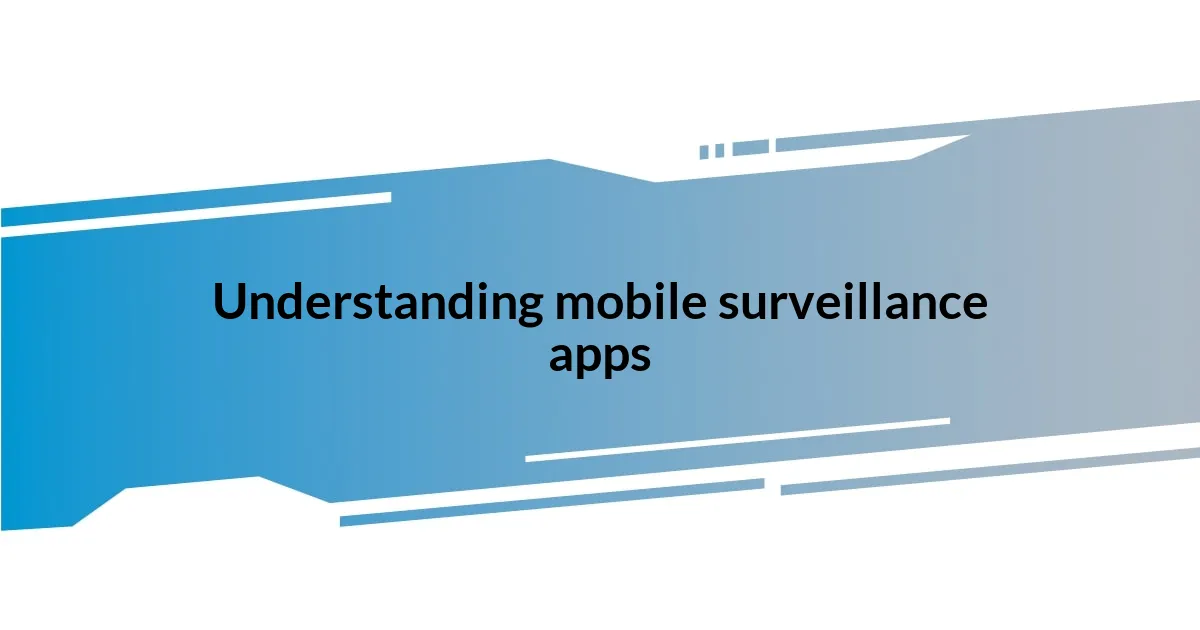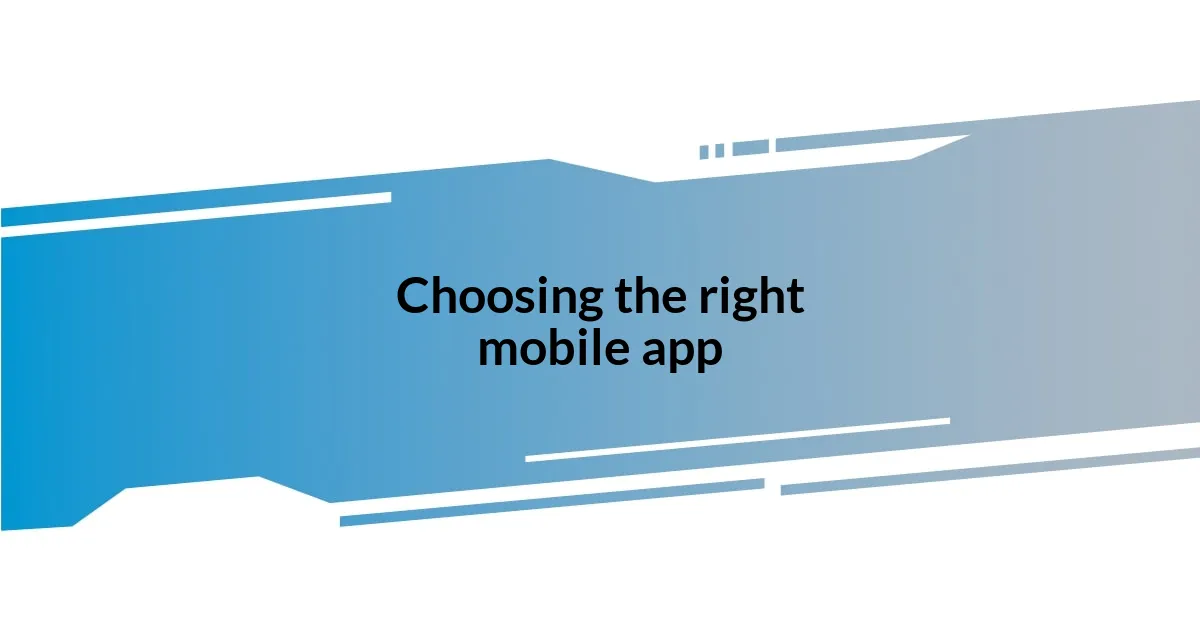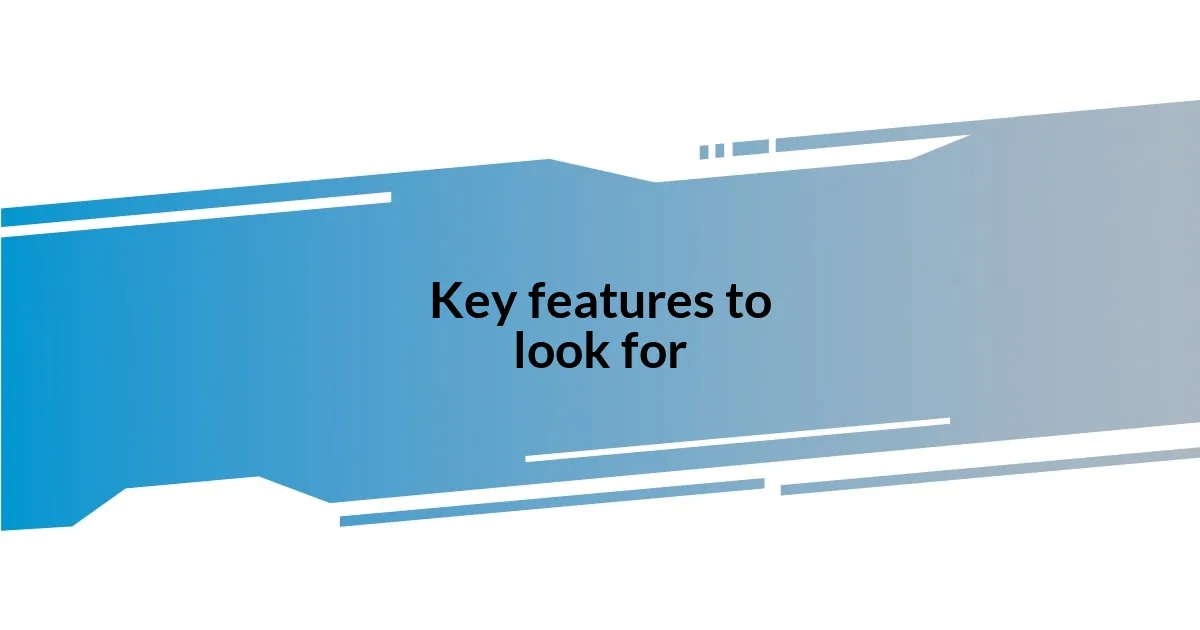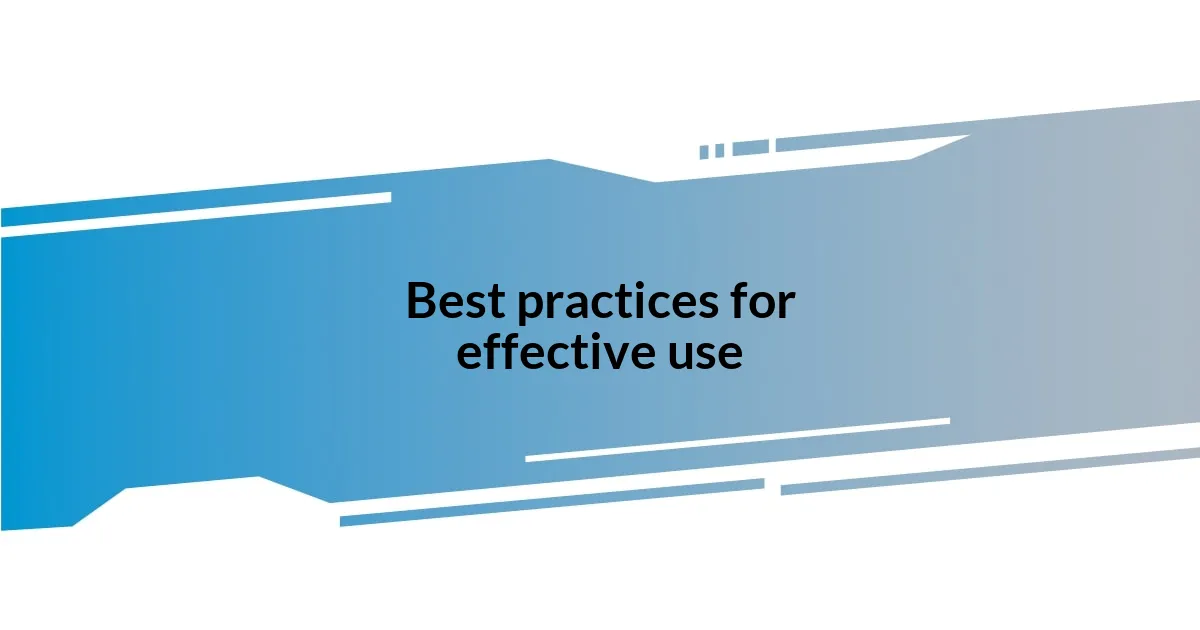Key takeaways:
- Mobile surveillance apps enhance personal security, offering features like real-time tracking and geofencing, but raise ethical questions about privacy and trust.
- Choosing the right app requires assessing specific needs, user reviews, and device compatibility to ensure effective functionality.
- Key features to prioritize include real-time tracking, geofencing, social media monitoring, and a user-friendly interface, along with responsive customer support.
- Best practices involve setting clear objectives, regularly updating the app for security improvements, and maintaining open communication with those being monitored to foster trust.

Understanding mobile surveillance apps
Mobile surveillance apps serve a variety of purposes, from enhancing personal security to monitoring children’s online activities. I remember the first time I installed such an app. It was a mix of apprehension and necessity, driven by a desire to ensure my child’s safety while they navigated the digital landscape. Have you ever wondered whether you’re doing enough to protect your loved ones online?
These apps often feature real-time tracking, geofencing capabilities, and even social media monitoring. I still recall the moment I received an alert about an unusual location my child was at; it felt like a tightrope walk between trust and vigilance. It really makes you think—how much oversight is too much? Balancing security with independence can be tricky.
Understanding how these apps function, including the ethical implications of using them, is crucial. For instance, while the ability to view someone else’s messages can provide peace of mind, it also raises questions about privacy and trust. I often find myself contemplating: is the peace of mind worth the potential strain it could put on relationships?

Choosing the right mobile app
Choosing the right mobile surveillance app can feel overwhelming, considering the numerous options available. I’ve spent countless hours evaluating features, and one key thing I learned is to prioritize my specific needs. For instance, if your main focus is location tracking, look for apps with strong GPS functionalities and geofencing options, as those can help provide peace of mind in real-time situations.
It’s also essential to consider user reviews and app ratings. I remember the time I was torn between two different apps. After reading detailed feedback from other parents who had similar concerns, I chose the one with a transparent privacy policy and a responsive support team. This experience taught me that real-world usage often tells a story that marketing can’t convey. Have you ever relied on a recommendation that made a huge difference in your decision-making?
Lastly, always think about the app’s compatibility with your devices. Some apps operate seamlessly across multiple platforms, which is a huge plus. When I switched from Android to iOS, I learned the hard way that not all apps transitioned smoothly across devices. It was a reminder that functionality can vary based on the technology ecosystem you’re in. By taking the time to assess user needs, insights, and compatibility, I’ve managed to find apps that truly meet my family’s security expectations.
| Criteria | Examples of Apps |
|---|---|
| GPS Tracking | Life360, Geo Tracker |
| User Reviews | Net Nanny, Qustodio |
| Device Compatibility | Find My (iOS), Family Locator (Android) |

Key features to look for
When searching for mobile surveillance apps, there are a few standout features that can enhance your experience. One of my top priorities has always been real-time location tracking. I still remember the first time a notification popped up, letting me know my teenager had arrived at a previously agreed-upon spot. It was a blend of relief and affirmation that I had made the right choice in selecting an app that delivered on real-time insights.
Key features to consider include:
- Real-Time Tracking: Ensures you know where your loved ones are at any moment.
- Geofencing: Allows you to set safe zones and receive alerts when those boundaries are crossed.
- Social Media Monitoring: Keeps an eye on online interactions and helps safeguard against potential risks.
- User-Friendly Interface: An intuitive design makes it easier to navigate and access essential functions.
Additionally, the importance of a robust customer support system cannot be overstated. I recall a moment when I faced a technical hiccup while trying to adjust my app settings. After reaching out to the support team, they were very responsive and guided me through troubleshooting, which personally affirmed my trust in their service. This kind of support can significantly enhance the overall experience with the app, ensuring you feel secure and informed.
So, whether you’re focused on real-time tracking or seeking user-friendly interfaces, these features are crucial in securing both your information and peace of mind.

Best practices for effective use
To make the most out of mobile surveillance apps, I’ve found that setting clear objectives is crucial. When I first started using these apps, I was a bit scatterbrained—trying to monitor everything at once. It overwhelmed me, and I realized that pinpointing what truly mattered, whether it was location tracking during specific hours or monitoring social media interactions, made the experience far more manageable and effective.
Another best practice is to regularly update the app and its features. I once discovered that skipping updates meant missing out on enhanced security measures that could better protect my information. When I finally took the time to update, I was pleasantly surprised by the new functionalities. Have you ever hesitated to update your apps, thinking it’s just a minor tweak? I learned the hard way that those small updates can make a significant difference in overall effectiveness.
Lastly, maintaining open communication with those being monitored is essential. I remember having a heartfelt conversation with my teenager about why I chose to use a surveillance app. It transformed the situation from one of mistrust to mutual understanding. By being transparent about my intentions, I created an environment where my child felt more secure rather than scrutinized, proving to me that trust is a two-way street. How have you handled the delicate balance between safety and privacy?